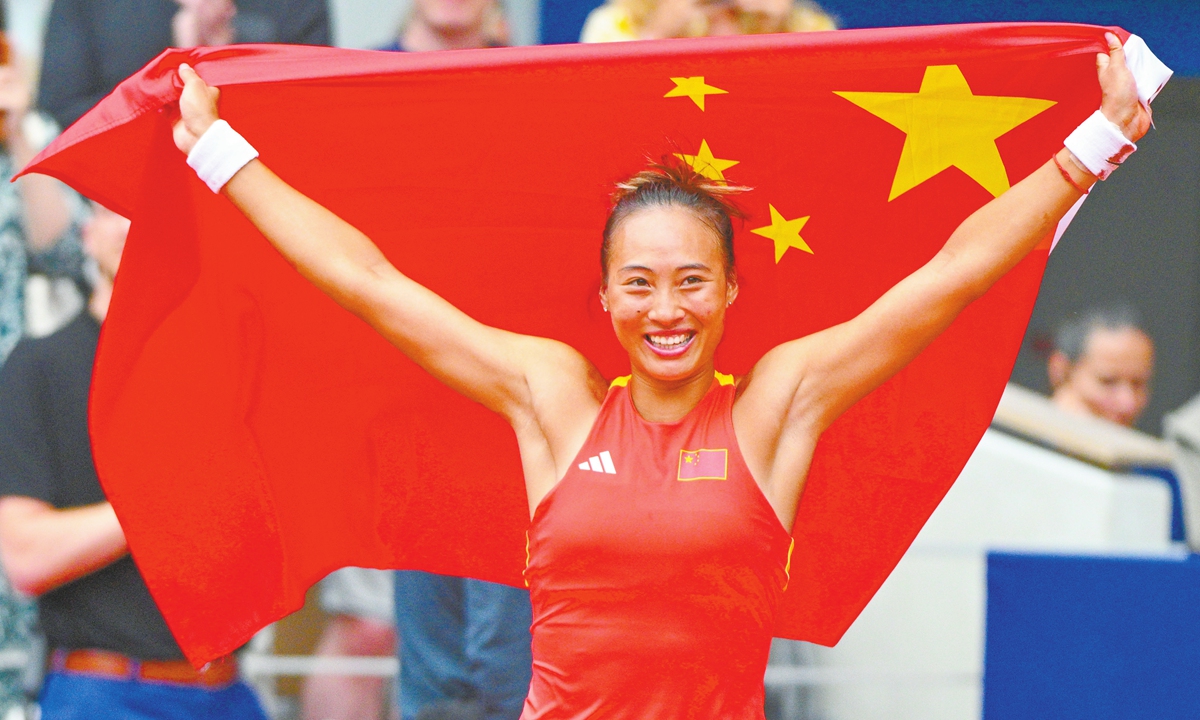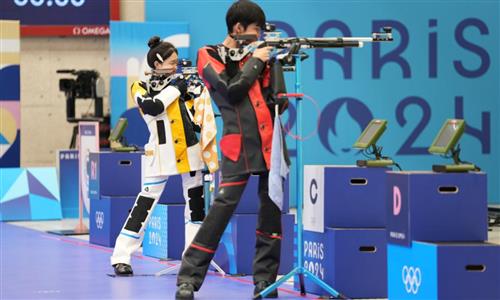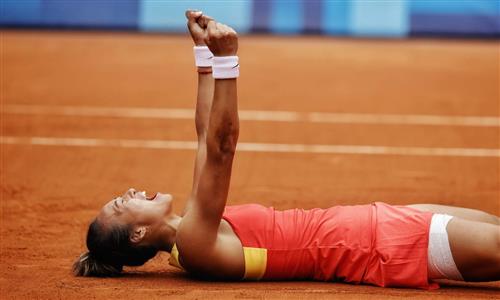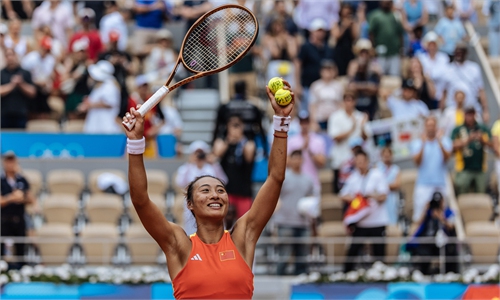The West should respect China’s development and breakthroughs: Global Times editorial

Chinese tennis player Zheng Qinwen celebrates her historic victory after winning in women's singles gold medal match against Donna Vekic of Croatia at the Paris 2024 Olympic Games in France on August 3, 2024. Photo: IC
In the early morning of Sunday, Beijing time, in the women's singles final of the Paris Olympic Games, 21-year-old Zheng Qinwen defeated her opponent, making history in Chinese tennis and winning the first gold medal for a Chinese and even Asian athlete in the Olympic Tennis event. Previously on Thursday, in the men's 100-meter freestyle final, Pan Zhanle set a new world record and won the championship with an astonishing time of 46.40 seconds.
Chinese athletes have successively won gold medals in swimming, tennis and other sports that were largely dominated by the West in the past, representing the overall improvement of China's competitive sports level. In fact, it has taken several generations of athletes for the Chinese swimming team to catch up and surpass the powerful Western teams.
Today, the Chinese swimming team members are more confident and mature. These breakthroughs are not surprising at all. Similarly, the progress of Chinese tennis is obvious to all. In addition to Zheng Qinwen, Wang Xinyu and Zhang Zhizhen also won mixed doubles tennis silver medal, showing that Chinese tennis has shown a transformation from "individual breakthroughs" to "collective breakthroughs."
The outstanding performance of Chinese athletes also reflects the growth of China's comprehensive national strength.
As we all know, competitive sports are a competition of athletes' physical fitness and skills. It is also a comprehensive competition that integrates nutrition, sports science, manufacturing science and other disciplines.
According to a survey by the British Lawn Tennis Association, developing a pro tennis player from the age of 5 to 18 may cost over $300,000. The same is true for swimming. As far as venues are concerned, swimming pools have been popularized in Western developed countries for a long time, while developing countries started much later. Therefore, the British broadcaster BBC once cited an expert as saying that Zheng Qinwen may be "the best soft power that China has."
China's breakthroughs on the sports field have a significant impact, that is, in large-scale international sports events, winning gold medals is no longer exclusive to developed countries. Countries in the "Global South" are increasingly participating and making their presence known, even ranking among the top in the world. This trend actually promotes the Olympic movement to truly become more "international."
Unsurprisingly, in the face of the outstanding performance and transcendence of Chinese players, some Westerners were overwhelmed and showed their paranoid and narrow-mindedness. Australian swim coach Brett Hawke is one of them.
After the 100m freestyle race, he said in a video, "That's not real, you don't beat that field - Kyle Chalmers, David Popovici, Jack Alexy - you don't beat those guys by one full body length in 100 freestyle. That's not humanly possible, okay. He further asserted, "If it seems too good to be true, it probably is."
Hawke's remarks are not worth refuting, as the actual performance of Chinese athletes like Liu Xiang and Su Bingtian has already shattered the Western so-called "racial determinism."
However, this bizarre mindset of "you cannot beat me, otherwise you are cheating" does not only exist in sports competitions. Over the years, we have seen similar performances on many issues.
For example, faced with China's rapid development in the aerospace field, the director of the National Aeronautics and Space Administration publicly made ridiculous statements such as that China joined the space race by stealing others' technology. These fundamentally stem from the inability to face and acknowledge China's development achievements, leading to distorted fantasies.
When faced with competition, instead of choosing to train harder, choosing to find ways to disqualify the opponent reflects not only a narrow mind and lack of generosity, but also to some extent reflects how this country has achieved success in the past. The US has become the world's only superpower, with a history of using many unsavory means. Now these actions have spread to the sports field, with the American side smearing and slandering the Chinese swimming team, reflecting the same narrow-mindedness. This is not only a habitual arrogance, but also a self-imposed barrier to new information and new things. This is why the Olympic motto "Faster, Higher, Stronger - Together" is particularly important today.
Today, when Chinese athletes stand on the Olympic podium, it is the result of Chinese participation in global competition. In the arena, Chinese athletes winning gold is the same as athletes from other countries winning gold, as it is the result of fair, just, and open competition.
There is a similar logic outside the arena as well. Whether in the fields of sports, economy, or technology, Western countries have long been in a leading position. This position has a certain degree of inertia, but this does not constitute a reason why the West can always lead or dominate the track. In a sense, human development is a track and field race in which one chases another.
Everyone is constantly breaking through themselves and at the same time breaking through the limitations of humanity. In this regard, the struggle for fairness, justice, and open competition is the struggle that belongs to all of humanity. For the West, recognizing and respecting the progress of competitors is a dignified act, and may also mean new development and progress.
Many people have noticed that the new generation of Chinese athletes are increasingly showing the grandeur of a great nation.
They naturally praise and encourage athletes from other countries, are proficient in speaking English off the field, and are confident and inclusive in cross-cultural interactions. They use the universal language of sports to present a new understanding of China to the world - always striving for excellence and breakthroughs, and promoting cultural exchanges and mutual learning in a peaceful and cooperative manner, fostering mutual understanding among people. This is evident both on and off the sports field.



